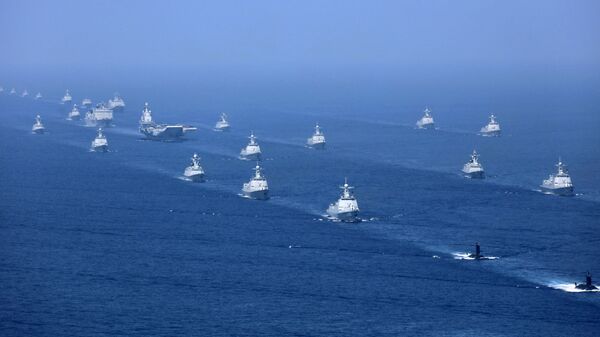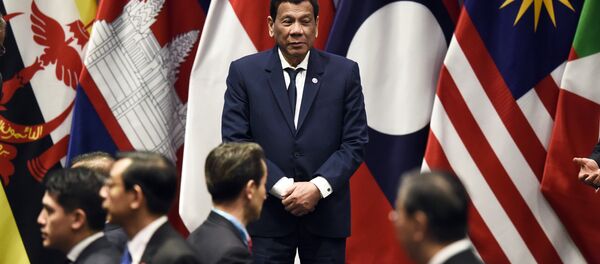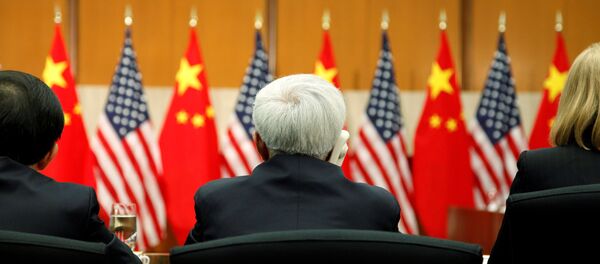Sputnik: Why has Pence chosen the ASEAN-US summit to make his statement? What signal does his message send and to whom?
Jay Batongbacal: The choice of the venue is clear because there have been misgivings within ASEAN, ruing concern that the United States is not taking as visible or a stronger stand, nor as if really a clear policy on the South China Sea. So Mr. Pence here is trying to give that reassurance that the United States definitely still is interested in what's going on in the South China Sea and is trying to allay any such unstated or otherwise undisclosed concerns.
Sputnik: Singapore Prime Minister Lee Hsien Loong said that it was very desirable not to have to take sides but will it come to this? What position do the US-China tensions put the region into? It is a very difficult situation for all countries involved in the South China Sea environment, isn't it?
Jay Batongbacal: Yes, indeed, because historically ASEAN has been concerned and would rather not see the region to become another arena for superpower competition. They look at the past as an example of what could happen if major powers would use to make the South East Asian region as their arena. The smaller countries essentially would be the ones to suffer the brunt of such competition. So Singapore PM's statement really is a continuing expression of that concern.
Jay Batongbacal: Well, I think the Belt and Road Strategy is a logical course of action for China to take, given its expanding economy. It needs places to bleed off excess capacity in its finances, in its economic capabilities and its options really. It needs to invest its money elsewhere, literally.
On the other hand, while that is a good thing for the region, for the smaller South East Asian countries, the neighbours here with whom it has competing claims in the South China Sea, and for other neighbours of China on the other side of the Indian Ocean side, there are concerns that that might… that it is being parallel to other efforts of China which seem to be not as friendly, not as mutually beneficial, particularly when it concerns military and strategic matters. So they are concerned that China's economic influence might somehow be connected with its parallel effort to develop military and strategic dominance in the region.
Sputnik: Who is going to actually come on board with any plan that Pence has to set out, I mean it is a very potent question, isn't it?
Jay Batongbacal: Yes, that is true because up till now the United States has not been able to present economic component or an economic aspect to its concerns in the region, its interests in the region.
Today it has been principally the military interest that has been very visible and prominent and due to respect to economic aspect, unfortunately, the United States under Donald Trump basically withdrew from that when he cancelled the US participation in the TPP. So, that has left the region really with no economic alternative to China's economic initiatives. So, that I think is another weak spot in the American policy in the region.
Sputnik: It's very interesting this strategy, the Belt and Road Initiative. Now there are tensions also brimming between China on so many fronts within the South China Sea. Of course, obviously, China is trying to get closer with all other Eurasia countries in terms of developing the road and communications infrastructure which is going to bring some of the other countries closer. But if you look at the confrontation specifically in the South China Sea will the confrontation there lead to exacerbations in the long run, do you think, with the closest allies?
Jay Batongbacal: Well, I think we are already seeing some friction and exacerbation, as you call it, and it comes to the relationship with allies and friends. As you know here in the Philippines, the Duterte administration has taken a very different track from in the business administration and has chosen to try to cultivate relations with China while leaving its relationship with the US sort of in the background.
That kind of situation might be similarly reflected in how the United States relates with other countries in the region, although they are not allies they have been mainly trading partners to some degree. And that will create more difficult choices really for the South East Asian nations because they see both countries basically as potential markets. They see both as necessary for their own economic plans and progress.
And if those two countries are competing with each other as they are now locked in a trade war, if it turns out badly, if the trade war worsens then indeed it will descend more difficult choices for these countries. The situation which the Singapore PM has described as ‘being forced to choose sides'. That definitely is not a choice that the countries would want to make.
The views expressed in this article are those of the speaker and do not necessarily reflect those of Sputnik.




